A comienzos de 2025, a través de sus redes sociales oficiales, las embajadas británicas acreditadas en Sudamérica presentaban al Reino Unido como uno de los líderes globales en soft power (poder blando).
Vayamos desde el comienzo para no dar por supuesto ciertas definiciones. El poder duro o hard power son los medios coercitivos que tiene una Nación para imponer su voluntad a otra. Por lo general, cuando hablamos de medios de estas características solemos referenciarlos al poder militar que tiene un Estado y que incide de forma directa sobre la realidad material de otro país (territorios, recursos naturales…). Un claro ejemplo en la historia argentina reciente fue el desenlace del Conflicto del Atlántico Sur en junio de 1982 por el cual el Reino Unido, mediante el uso de la fuerza, no sólo volvió a ocupar el archipiélago de Malvinas, sino que amplió su dominio colonial sobre los espacios marítimos argentinos hasta 200 millas náuticas alrededor de cada Isla. Otros elementos de poder duro, además de los clásicos militares, podrían ser aquellos vinculados con las operaciones de inteligencia o contrainteligencia o acciones coercitivas con medidas vinculadas con la economía, el comercio internacional e incluso el desarrollo científico-tecnológico y que impacten de forma directa en la realidad material parcial o total de una Nación.
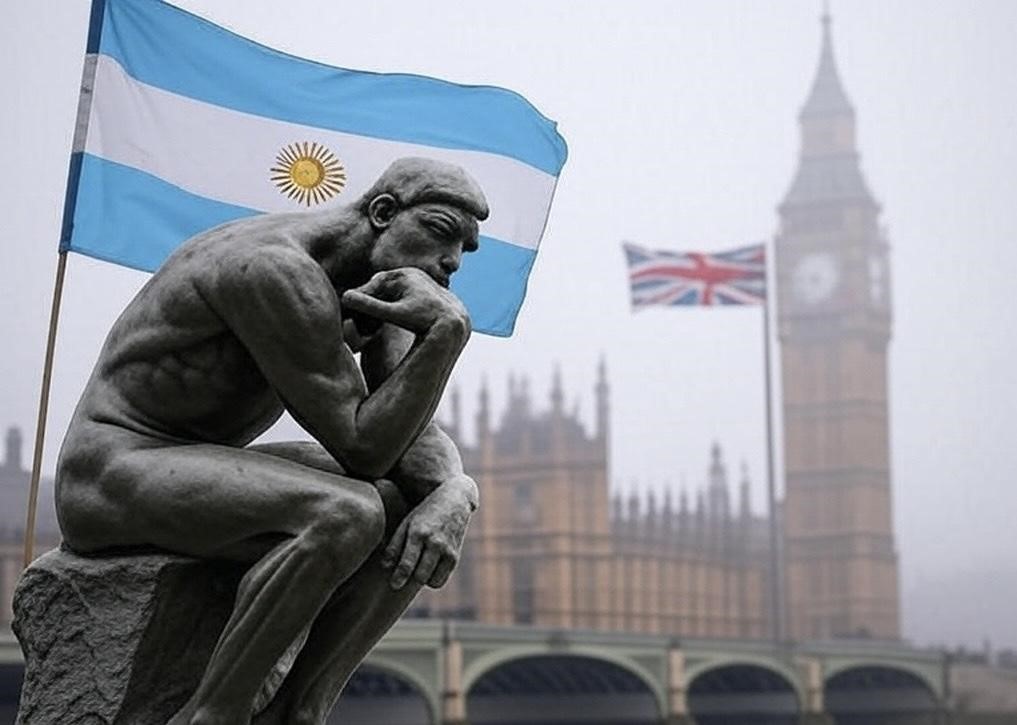
¿Qué es entonces el poder blando y en qué se diferencia del duro? Como bien indica su nombre, se mantiene el objetivo de dominación, pero los medios empleados buscan una interpelación a la subjetividad de las personas para que cumplan con determinadas acciones sin la sensación opresiva que sí generan, por el contrario, los medios coercitivos del poder duro. Ejemplos de estos tenemos muchos, pero los de mayor protagonismo son la diplomacia en toda su amplitud (tradicional, científica, artística, deportiva…), la educación y la cultura como elementos que terminan por consolidar una cosmovisión que estructure una percepción del espacio (la geografía) y el tiempo (la historia) afín a sus intereses.
El poder blando y el duro dialogan entre sí permanentemente. Siendo el primero aquél que funciona de forma permanente en tiempos de paz y el segundo es aquél que se asoma “cada tanto” a modo de advertencia y que brota de forma violenta y explícita en tiempos de guerra.
Como bien indica el título de este artículo, no es pretensión hablar en estas líneas ni de la Guerra de Malvinas, ni la reducción constante y sistemática de nuestro presupuesto de Defensa en los últimos 40 años, ni de las consecuencias económicas de la ocupación británica sobre los espacios marítimos argentinos en el Atlántico Sur. Por el contrario, vamos a hablar de cuáles son los mecanismos del poder blando británico que opera en la Argentina y su impacto en la discusión por Malvinas y la soberanía nacional cognitiva.
La desmalvinización y las universidades
La desmalvinización como fenómeno se inaugura en la inmediata posguerra, específicamente en junio de 1982, cuando la última dictadura decidió ocultar a nuestros soldados que regresaban al continente de los frentes de batalla de las Islas. La misma se sostiene en dos grandes pilares desde el Estado: el primero fue el ninguneo sistemático a nuestros veteranos y héroes de Malvinas. El segundo fue la reducción de políticas públicas tendientes al objetivo de la recuperación del ejercicio pleno de soberanía del archipiélago, desde la implementación de una estrategia y visión de una política exterior funcional al colonialismo británico en el Atlántico Sur hasta medidas económicas que impacten de forma negativa en nuestras capacidades nacionales de defensa, industriales, científicas y educativas. Luego de la crisis del año 2001, punto álgido de la desmalvinización, se le fue oponiendo el fenómeno contrario al que denominamos de remalvinización, sobre todo a partir de julio del año 2003. Ambos procesos opuestos y secuenciales se desarrollaron lentamente y sus efectos (adversos en la desmalvinización y virtuosos en la remalvinización) se han visibilizado tardíamente como cosechas de larga duración.
Las universidades no fueron ajenas a este proceso con un severo impacto negativo en la totalidad del sistema educativo a nivel nacional. Por un lado, se han formado profesionales argentinos, investigadores, docentes universitarios y profesores de escuelas secundarias con currículas que reproducen una visión colonial británica forjada en la posguerra y que por el otro han abonado en muchos ámbitos a construir un “sentido común” de que las “Malvinas se perdieron en la guerra”, que gracias a los británicos “recuperamos la democracia en 1983” y que ya no se puede hacer más nada porque “los isleños, que son los dueños de las islas, quieren ser ingleses”. Estos mensajes que por mucho tiempo se replicaron de forma estratégica y quirúrgica en determinados medios de comunicación actualmente se reproducen en el ciberespacio a través de las redes sociales y nuestros teléfonos celulares.
La cuestión de las universidades no es menor porque son los espacios de producción de conocimiento tanto científico como popular. Pero para no hacer un análisis en abstracto vamos a desglosar brevemente los puntos sensibles en donde impera el poder blando británico con el objetivo de alterar nuestra percepción espacio-temporal y cumplir sus deseos de bajar los brazos en nuestro reclamo de soberanía por Malvinas.
La geografía y la disputa por el espacio
El mapa bicontinental argentino comenzó a diseñarse a mediados de la década de 1930 para cristalizarse definitivamente en la cartografía oficial de nuestro país a finales de la década de 1940 a la par de la inclusión obligatoria de la cuestión Malvinas y la Antártida en las currículas escolares. Lamentablemente el mapa tuvo su declive con posterioridad al golpe de 1955 y una efímera resurrección durante el Conflicto del Atlántico Sur de 1982. Luego cayó en desgracia como consecuencia de la desmalvinización de posguerra hasta que se le hizo justicia volviéndolo a incorporar de forma obligatoria al sistema educativo a través de la ley 26.651 del año 2010 que fue votada por unanimidad de todos los partidos políticos.
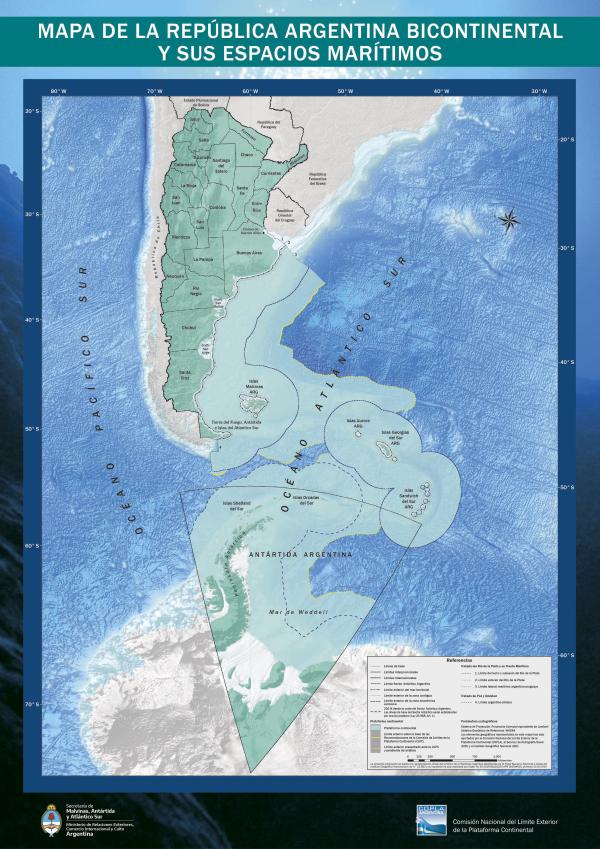
El mapa bicontinental argentino es fundamental porque es nuestra hoja de ruta argentina en el siglo XXI: dependerá de nosotros de forma intergeneracional hacer de este mapa una realidad efectiva y no que quede solamente como un hermoso diseño cartográfico del Instituto Geográfico Nacional. Al mapa bicontinental argentino se le opone el mapa que ilustra la ocupación colonial británica sobre los espacios marítimos argentinos usurpados después de la Guerra de Malvinas en donde llegamos a la triste cifra de que por lo menos un cuarto de nuestro territorio total (insular y marítimo) y sus recursos naturales está en manos de los ingleses.
Ahora, frente a lo que podría ser una imagen que sintetice la voluntad y el destino de un pueblo a lo largo del siglo que estamos transitando, no faltaron detractores del ámbito científico que atacaron al mapa acusándolo de reflotar un “nacionalismo enfermizo”.
Sin embargo, la nota citada publicada en el diario Clarín en el año 2010, curiosamente, no tiene “firma” o autor. Pero para febrero del 2015, surgió una nota en La Nación mucho más esclarecedora en donde se presenta a un matrimonio anti mapa bicontinental: Carlos Reboratti (geógrafo) e Hilda Sábato (historiadora). Ambos investigadores superiores del CONICET serían los principales protagonistas de la gesta en contra de la soberanía argentina en la Antártida argumentando que, como nuestro país firmó el Tratado Antártico en 1959, no estaría ejerciendo soberanía sobre el continente blanco. Dos cosas llaman poderosamente la atención: la primera que Reboratti y Sábato vivan a base de erogaciones del Estado argentino para confrontar contra los intereses…del propio Estado argentino. Lo segundo es que siendo investigadores de la mayor jerarquía en el ámbito de las ciencias sociales de nuestro país, en su lucha obstinada contra el mapa bicontinental hagan gala de su desconocimiento absoluto sobre el derecho internacional dinamitando el capital más preciado que tiene un científico: su prestigio derivado de su conocimiento.
Aprovechamos estas líneas para aclarar dos cosas que se reproducen constantemente en redes sociales y que ponen en riesgo la calidad del debate político sobre la Antártida: 1) El Tratado Antártico NO VENCE EN 2048 ni tiene fecha de caducidad o vencimiento alguna y 2) La firma del Tratado Antártico de 1959, contrario a lo que se cree, no solo no supone una renuncia de la soberanía argentina en la Antártida sino que a su vez es el instrumento que preserva dichos derechos que se encuentran resguardados en el artículo 4° del Tratado.
En resumidas cuentas: el Mapa Bicontinental es correcto, tanto para el derecho internacional como para la normativa interna. Curiosamente, sus detractores, hablan poco y nada de la cartografía colonial británica y menos que menos de la ocupación de nuestro mar y recursos naturales en el Atlántico Sur.
La historia y la disputa por el tiempo
Nunca en la historia de la historiografía argentina se relativizó la soberanía territorial del país. Siempre había quedado en claro que el punto de partida eran los límites del antiguo Virreinato. Pero salvando la soberanía territorial, nuestro país se caracterizaba por tener apasionados debates de historia argentina sobre cualquier tema. El bicentenario fue una década (2006-2016), que puedo dar fe, fue propicia para rediscutir nuestra identidad como Nación. También sirvió para visibilizar en la superficie el paradigma historiográfico británico creado a la luz de la posguerra de Malvinas, difundido hasta el hartazgo en redes sociales y que es alegremente reproducido por algunos historiadores locales.
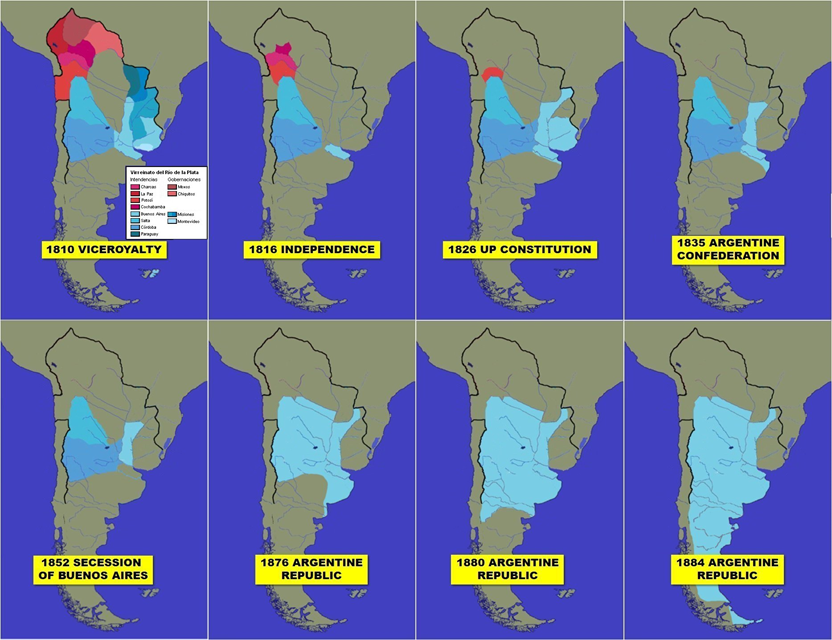
“Evolución territorial argentina” según usuarios ingleses en la red social “X/Twitter”
El paradigma consiste en aferrarse a un tipo “ideal” de Estado-Nación unitario por el cual tenga una Constitución Nacional, un gobierno centralizado consolidado, fuerzas armadas nacionales y una moneda única. Graciosamente algunos historiadores locales concluyen, junto a sus pares británicos, que recién la Argentina para 1880 se acercó en “términos reales” a ese tipo idealizado. Por lo tanto, si Argentina nace en 1880 todo lo que había pre-1880 (1806-1879) era una no-Argentina. Algunos, “más generosos” discuten este paradigma planteando de qué está mal plantear a 1880 como punto de partida, sino que el verdadero sería 1860 cuando Buenos Aires juró la Constitución Nacional. En ambos “matices” (1880/1860) la conclusión es la misma: ni Saavedra, ni Mariano Moreno, ni Manuel Belgrano, ni San Martín, ni Güemes ni ningún caudillo federal serían argentinos. Incluirlos en los billetes o en los manuales escolares es totalmente erróneo. Los que creíamos que eran nuestros próceres, ya no lo son. Pero no sólo los humanos ya no nos corresponden, sino que tampoco el territorio.
Las Islas Malvinas fueron ocupadas por los británicos en 1833. Frente a esto los ingleses plantean que, “como Argentina no existía en 1833”, “no deberían tener derecho alguno de soberanía sobre las Islas”. Esto se agrava aún más, cuando además de querer despojarnos de nuestros territorios insulares, pretenden relativizar nuestra soberanía en la Patagonia dibujando mapas en donde Argentina terminaría al Sur en el río Salado y lo que estaba más allá de ahí era como un “Estado independiente” que fue ocupado por la fuerza por el “imperialismo argentino” (?).
Cada vez que menciono esto a un compatriota, me responde de forma sensata que no le haga caso dado que es un simple “delirio inglés”. El problema no son los delirantes ingleses sino los científicos “argentinos” que presentan como verdad irrefutable las pretensiones coloniales británicas en nuestro territorio. Esto se conjuga en dos estrategias: relativizar tanto el pueblo como el territorio argentino del período 1806-1879 negando toda soberanía al sur del río Salado y por el otro atribuirle al triunfo británico de la Guerra de Malvinas de junio 1982 el retorno de la democracia contemporánea.
Algunos historiadores como Roy Hora plantearon en abril de 2023 que el feriado de 2 abril había que sacarlo y que por suerte “Argentina perdió la guerra”. Otros, como Federico Lorenz, director del Museo Nacional de Malvinas en tiempos de Macri (2016-2018), fue un poco más allá y planteó que el “el feriado debería ser el 14 de junio que marca el inicio de la democracia argentina”. Demás está aclarar que ambos dos, tristemente, son investigadores del CONICET.
Pero, a diferencia de antes (2015-2022), lo que podía ser una “intuición” de que había cierto alineamiento entre ciertos posicionamientos o incluso paradigmas de historiadores con el statu-quo colonial británico, nos encontramos con la realidad de que la embajada británica dejó de tener “aproximaciones sutiles” a tener un mayor protagonismo explícito de querer infiltrarse en la educación y la cultura argentina. Entre el 10 y el 12 de abril de 2025 se celebró desde el Programa de Estudios de la Comunidad Británica en América Latina el encuentro titulado “200 años del Tratado entre Gran Bretaña y el río de La Plata” auspiciado por la embajada británica y la Cámara de Comercio Argentino-Británica (BRITCHAM). En las jornadas que se celebraron participaron en su mayoría cientistas sociales egresados de universidades públicas e incluso investigadores activos del CONICET. El título, por demás sugerente, planteaba la idea de que para 1825 “Argentina no existía” y que el vínculo bilateral inaugurado a partir de ese año fue entre Gran Bretaña y…el río de la Plata, es decir, no con una Nación soberana e independiente como la Argentina, sino con un curso de agua dulce.
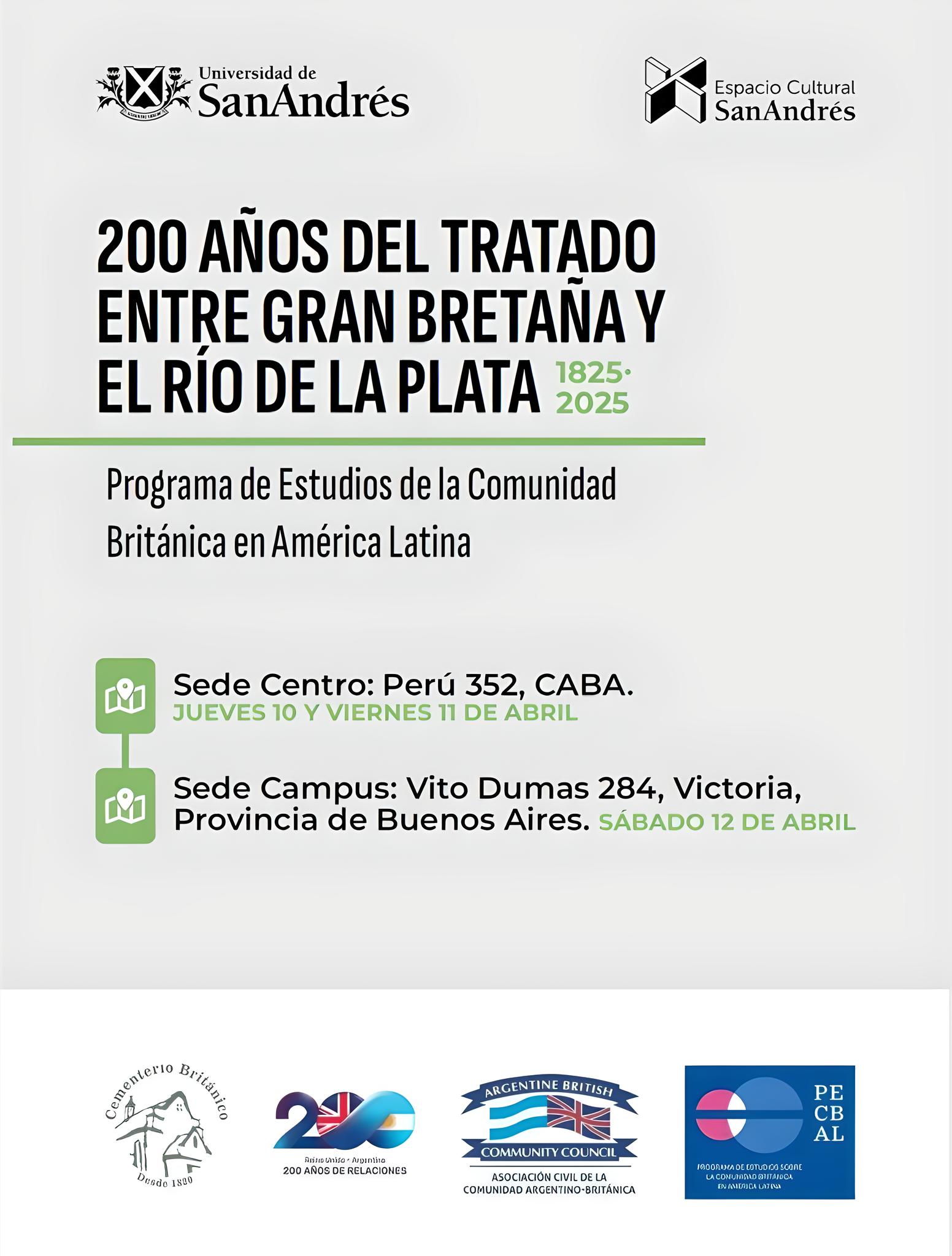
El encuentro, contó con la presencia personal de la embajadora que fue agradecida por su apoyo al evento y en su calidad de “arqueóloga” por ser una entendida de los “problemas historiográficos”. Por supuesto, y para no ofender a la embajada británica en tanto anfitriona y organizadora del evento, las ponencias estaban lejos de criticar duramente el colonialismo (sobre todo el actual), por no decir que directamente se endulzaron artificialmente, lejos de toda honestidad y profesionalismo de la cual uno esperaría de “historiadores académicos argentinos que viven en Argentina”, donde no faltaron algunas como “la prensa kelper en el centenario de la colonización sobre Malvinas”. Ni siquiera el paro general de la CGT del jueves 10 de abril pudo evitar dicha presentación, cuyo título es un claro guiño a los isleños como una “tercera parte en la disputa” y por lo tanto con derecho a la “autodeterminación”.
La economía
El 14 de junio de 2023, mientras los británicos en Malvinas festejaban el “Liberation Day” (“día de la liberación”) a exactos 41 años de la finalización de la guerra, irrumpió en escena una organización no-gubernamental denominada FUNDAR a través de la publicación, de lo que prometía ser su “informe estrella”, de aproximadamente 150 páginas llamado “Hacia una transformación productiva posible en Tierra del Fuego”. En la red social “X”, Roy Hora fue uno de los primeros en compartir el informe bajo la consigna de “muy buena iniciativa”. ¿Tenía Roy información anticipada de lo que se iba a publicar? ¿Tan rápido pudo leer las 150 páginas como para apurarse en adjetivar tan positivamente dicho informe?
Sobre el informe en sí, ya les respondimos a FUNDAR con el economista fueguino Juan Pablo Deluca, por lo que el objetivo de estas líneas es abordar otra cuestión. En resumidas cuentas, la publicación de FUNDAR se desdoblaba en dos: una introducción de escasos párrafos escritos por Martín Reydó, director ejecutivo de la ONG, donde bajaba una línea política que fue la que se reprodujo en grandes medios de comunicación. Irónicamente, o no, parte de las premisas de dicha introducción fueron refutados en gran parte por el propio contenido interno del voluminoso informe. La estrategia era muy clara: reproducir mediáticamente la efímera introducción “respaldada en un informe de 150 páginas” que en los hechos nadie lo iba a leer. Es hasta el día de hoy que me pregunto cómo hicieron los autores para escribir semejante cantidad de páginas sobre la provincia de Tierra del Fuego, Antártida e Islas del Atlántico Sur sin mencionar ni una sola vez “Malvinas”, “Reino Unido/Gran Bretaña”, “Colonialismo”, “OTAN”.
Sin embargo, a pesar del cargo, Reydó está lejos de ser el presidente o “dueño” de FUNDAR, quien, por el contrario; se trata de Sebastián Ceria. Para quienes no lo conocen, Ceria es un matemático egresado de la UBA y un empresario exitoso que vive en Londres. Desde Inglaterra decidió crear FUNDAR, cuyos objetivos si bien son variados, en los hechos se caracteriza por reclutar científicos para realizar estudios e informes principalmente de economía Argentina. Por lo tanto, en este esquema, Martín Reydó cumple el rol de capataz local de la ONG. De más está decir que Argentina tiene muchos problemas económicos (déficit fiscal y cuasifiscal, caída de nivel de actividad, desempleo, informalidad laboral, evasión y elusión tributaria, intereses de deuda difíciles de pagar…), pero para la “omnisciencia” de Sebastián Ceria que todo lo ve con mayor claridad a 14 mil kilómetros en Inglaterra el gran problema del país es…el régimen de promoción económica de Tierra del Fuego.
El régimen constituido en la ley 19.640 se creó con el objetivo no sólo de poblar la Isla, sino para asegurar la proyección argentina hacia la Antártida y preparar las condiciones económicas de Río Grande (industrial) y Ushuaia (turismo) para el momento de la recuperación del ejercicio pleno de soberanía en Malvinas. Hay muchos ejemplos en el mundo del desarrollo económico de un espacio que está fuertemente vinculado con la geopolítica de una Nación, siendo el caso de Manaos (Brasil) o Shenzhen (China) los más conocidos y estudiados. Pero entonces, si la economía fueguina está íntimamente vinculada con la soberanía nacional ¿por qué tiene detractores y porque casualmente son sus voces las que más se repiten en los medios?
Juan Carlos Hallak, investigador del CONICET y uno de los autores del informe de FUNDAR, dió en la tecla en un twit sobre Tierra del Fuego de julio de 2024: “la geopolítica no es un tema”. Es decir, siempre el régimen de promoción “debería analizarse” sin Malvinas, sin colonialismo, sin Gran Bretaña, sin la guerra de 1982. El sesgo acientífico es claro: moldear el objeto de estudio para que las premisas concuerden linealmente con las (pre) conclusiones.
En un acto de gentileza y profesionalismo periodístico, Mariano Boettner publicó en las vísperas del 2 de abril una nota en INFOBAE titulada “Tierra del Fuego: el régimen de promoción, sus costos asociados y productos que son hasta 60% más caros en otros países”. En dicha nota, Boettner nos presenta la coalición anti-fueguina encabezada por FUNDAR, la Coalición Cívica, Margarita Stolbizer, el ex vicepresidente del BCRA y actual asesor del Ministerio de Desregulación a cargo de Federico Sturzenegger, Lucas Llach y la Fundación Libertad y Progreso (Agustín Etchebarne).

Fuente: X-Twitter
Lo interesante es que se ubica a FUNDAR en el mismo lugar con un radical abiertamente pro inglés que propuso que los ingleses también ocupen Tierra del Fuego (Lucas Llach), a un partido político que ha participado abiertamente de operaciones políticas de la embajada británica vinculadas con la explotación de nuestros recursos naturales (Coalición Cívica) y Margarita Stolbizer, quién ocupa el rol de cara visible “en contra del régimen”, y que a su vez, es compañera de bancada de Facundo Manes, quién propone medidas de protección ambiental para beneficiar la pesca ilegal británica en el Atlántico Sur (sí, literal como se lee).
¿Política Ambiental o eco-colonialismo?
En marzo de 2023, salió de Buenos Aires un avión de la ONG Solidaire liderado por su fundador, el cineasta Enrique Piñeyro. La cobertura de dicho vuelo fue analizada en detalle en una nota del mismo período por Nicolás Canosa y Franco Metaza.
En la nota de los autores podemos ver con claridad que, frente a lo que se presentó en los medios como una iniciativa “desinteresada” de un filántropo porteño acongojado por la vulnerabilidad de los ecosistemas del Mar argentino, se escondía una maniobra de política internacional que tenía por objeto de presionar a la Argentina a adherir a un instrumento que regule la pesca pasadas la milla 200 de nuestras costas, que se encuentran sobrepobladas de buques-factoría provenientes principalmente de China, pero mal que nos pese, es perfectamente legal.
La comitiva del vuelo a falta de uno, contó con 3 embajadores: el de Japón, el de Estados Unidos y…la embajadora del Reino Unido Kristy Hayes.
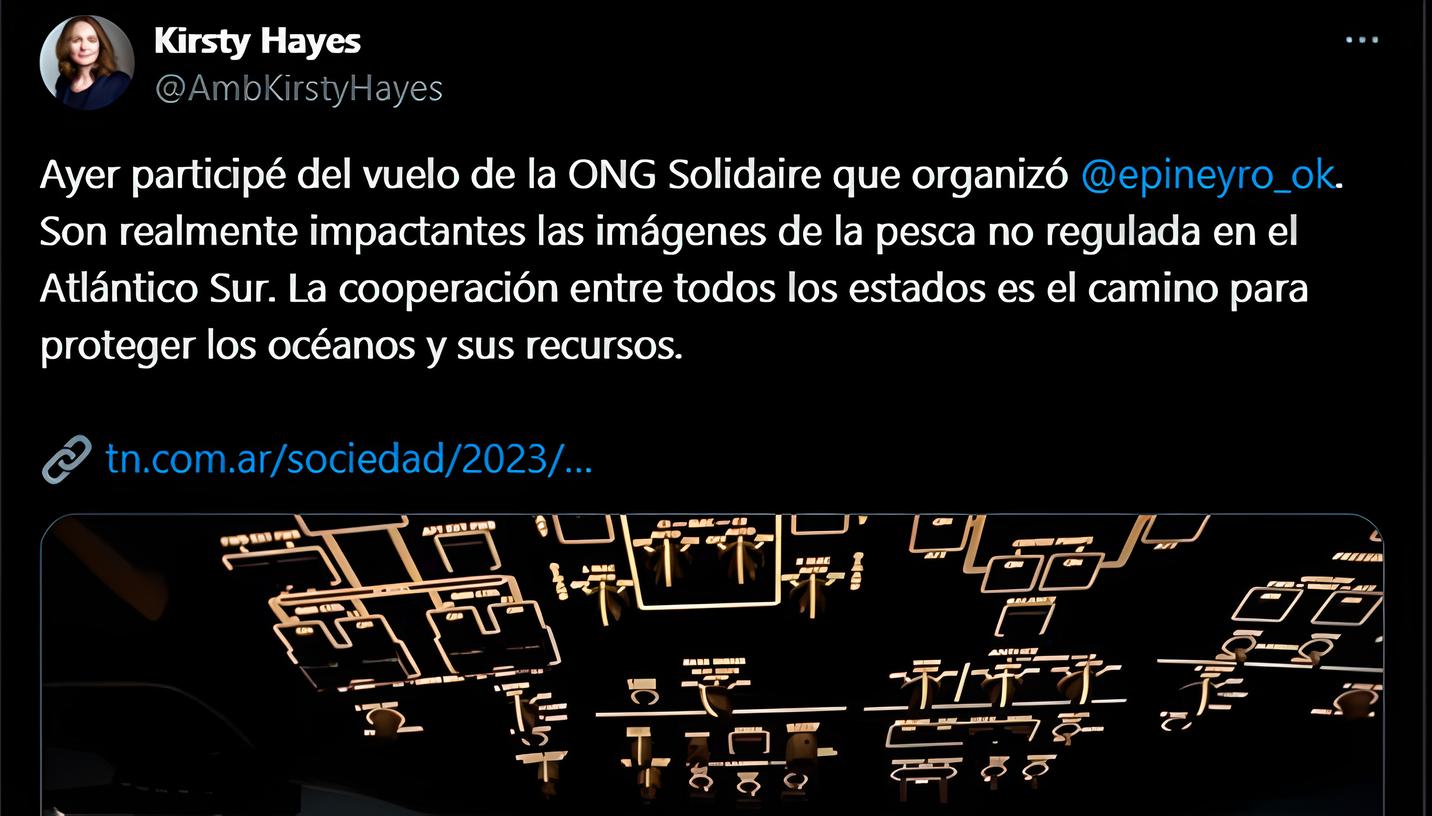
Fuente: X/Twitter
La participación de la embajadora británica no es casualidad, dado que la adhesión de la Argentina a un instrumento regulatorio de estas características implicaría sentar en una misma mesa en igualdad de condiciones a los Estados ribereños americanos que se proyectan en el Atlántico Sur: Brasil, Uruguay, Argentina y…el Reino Unido. Es decir, el gobierno británico propone que Argentina a nivel internacional reconozca como un Estado “Sudamericano y Sudatlántico” al Reino Unido desde, obviamente, la ocupación ilegal y colonial de Malvinas.
El vuelo tuvo una “llamativa” cobertura mediática y casualmente “perfectamente sincronizada”. En ninguna de las notas se habló, justamente, de la verdadera pesca ilegal que es la que realiza el gobierno británico en nuestras Malvinas. Por supuesto que el avión llegó hasta el paralelo 47° Sur a la altura de Santa Cruz. ¿Por qué no fue más al Sur? Porque justamente ahí se encontraban nuestras Islas ocupadas por los británicos. La única forma de que esa aeronave volara un poco más al Sur era con autorización explícita del gobierno británico. ¿Podría haberle pedido el filántropo de Piñeyro en pleno vuelo a la embajadora británica que le autorice surcar el espacio aéreo de Malvinas? Lo único que sabemos a ciencia cierta es que no sucedió.
Pero toda operación aérea, se suele acompañar de una operación marítima. En ese fatídico año 2023, algunos nos encontramos con una nueva “coronación de gloria”: Nicolás Marín Benítez, fotógrafo argentino, era elegido como el mejor de naturaleza del mundo de 2023. Nuestro pecho inflado de orgullo se desinfló rápidamente cuando nos enteramos que, dicho galardonado, era uno de los “elegidos” —casi en términos mesiánicos— de participar del proyecto “Darwin 200”: una travesía marítima que buscaba recrear la navegación del buque de la armada británica HMS Beagle, al mando del almirante Fitz Roy y acompañado por el homenajeado naturalista y científico del gobierno británico Charles Darwin. El proyecto tuvo una altísima cobertura de la BBC de Londres, cuya independencia del gobierno británico es idéntica a la de la TV Pública respecto del gobierno nacional.
Por supuesto el itinerario del HMS Beagle incluía, además de las Islas Galápagos en Ecuador, a las Islas Malvinas. Empezamos por aclarar que de ninguna manera la pintoresca embarcación de madera de Darwin 200 que emula al Beagle pudo siquiera haberse aproximado a las costas de nuestras Islas sin el permiso de quiénes ilegalmente las ocupan. No conformes con esto, de las imágenes de las travesías terrestres y particularmente en la Isla Soledad, se desprende que tuvo apoyo de las Fuerzas Reales Británicas. Sí: los mismos soldados británicos que hacen ejercicios militares en nuestras Islas, a veces con ghurkas de Nepal o soldados de Kosovo, son los que garantizaron parte de los desplazamientos en tierra de los jóvenes que pelean por la naturaleza, incluido el premiado fotógrafo argentino. Finalizado su periplo en Malvinas, cuando regresó al continente, Marín participó de intensas campañas con la consigna de que “llegó la hora de proteger los océanos” para abonar al plan “30 x 30” que consiste en proteger “el 30% del planeta para el 2030”.
Y acá es cuando los influencers y comunicadores ambientales dan un paso al costado y aparece la verdadera política y los roles. Así como al interior de la Coalición Cívica el diputado Juan Manuel López es el vocero en contra del régimen de Tierra del Fuego y los diputados Mariana Zuvic y Maximiliano Ferraro fueron la cara “política” del vuelo de Enrique Piñeyro tenemos, del mismo modo, a la ya mencionada Margarita Stolbizer como vocera antifueguina acompañada por su compañero de bloque en Diputados Facundo Manes quién es la cara visible a nivel nacional para cumplir con el objetivo de “proteger el 30% de los océanos argentinos”.
Pero mientras Zuvic y Ferraro buscan reglamentar la pesca pasadas la milla 200 y que Argentina firme un acuerdo que reconozca al Reino Unido como estado ribereño en nuestro propio territorio, Manes propone la creación de 6 Áreas Marinas Protegidas dentro de nuestra Zona Económica Exclusiva para que Argentina se abstenga de pescar los recursos ictícolas argentinos. Esto no sólo destruiría la industria pesquera nacional, sino que directamente buscaría que nuestro país se abstenga de realizar cualquier medida en el Mar para preservar (¡y atención con esto!) la pesca ilegal británica desde Malvinas. Una de las ONGs que impulsa el proyecto de Manes se llama Wild Conservation Society (WCS) que es, ni más ni menos, dueña de dos islas de Malvinas donadas a la organización por un filántropo norteamericano.
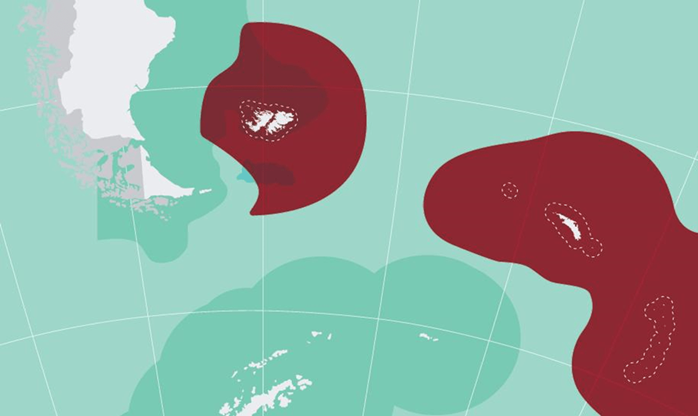
Ocupación británica en el Atlántico Sur donde no llegaron los vuelos de Enrique Piñeyro y donde sí se encuentra la pesca ilegal que busca preservar Manes. Fuente: Una Nación en el Mar, Ediciones OCIPEx, 2022.
El turismo colonial
En uno de los videos de la campaña de protección oceánica de Nicolás Marín aparecen actores de renombre que interpretan noteros en búsqueda desesperada de una declaración del fotógrafo como si se emulara una conferencia de prensa. Frente a la voz ya conocida de Julián Weich y Boy Olmi, se le suma de fondo una voz de una joven periodista llamada Celeste Giardinelli.
Celeste, al igual que Marín, también es miembro del proyecto Darwin 200, sólo que, a diferencia del célebre fotógrafo, siguió el curso por el Pacífico específicamente en la Isla de Pascua. Giardinelli cobró cierta notoriedad en redes sociales en el verano de 2025 por haber viajado a Malvinas con financiamiento de la embajada británica en el marco de un concurso llamado “Conozca a nuestros vecinos de las Islas Falklands” (SIC), cuyos requisitos para aplicar incluyen ser jóven universitario/a y estar activo en redes sociales como X, Instagram, Facebook y/o TikTok.
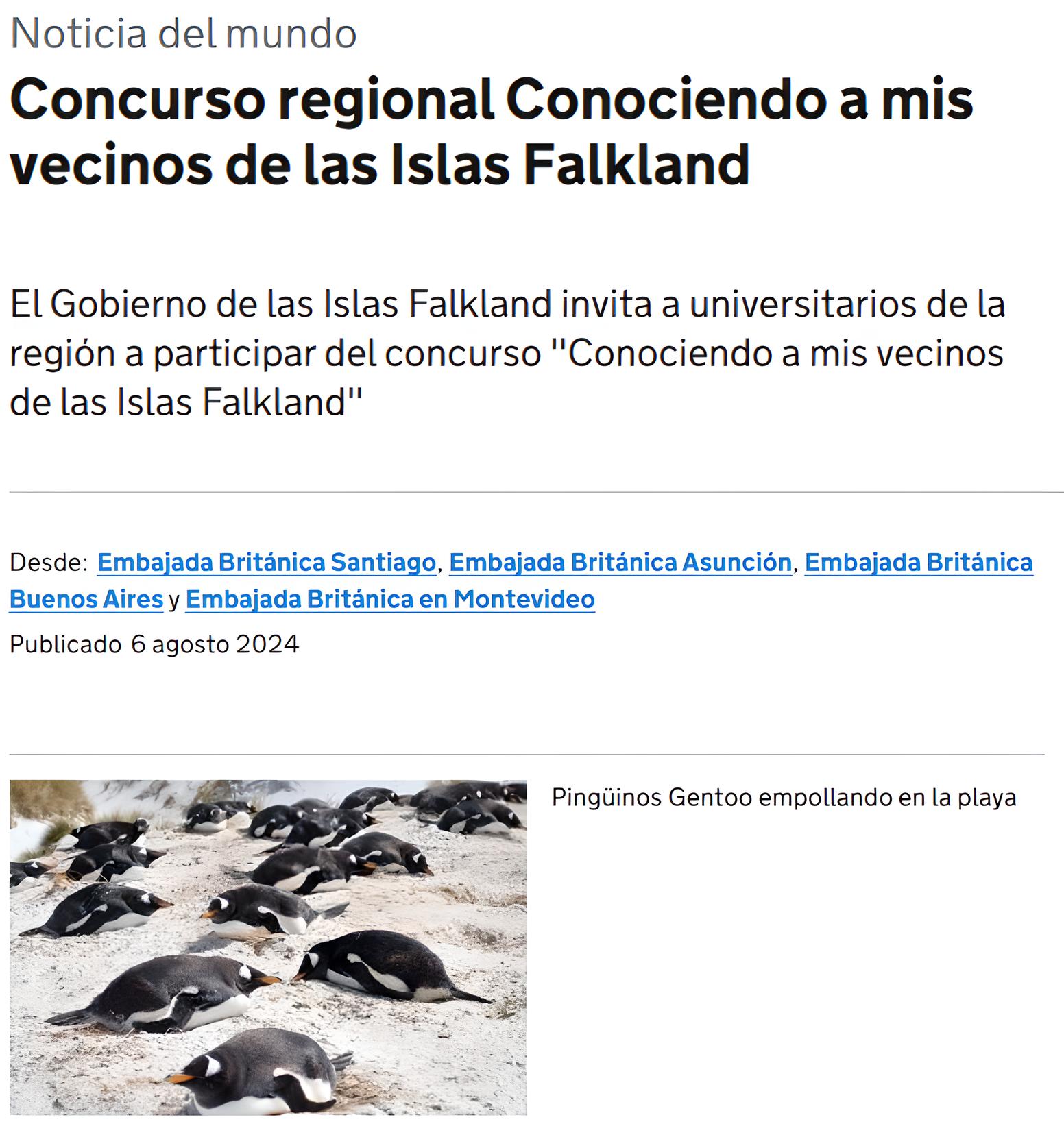
El concurso se hace de forma anual en donde la embajada británica elige a una persona por país de Brasil, Chile, Uruguay y Argentina (continental) para viajar a Malvinas una semana, ver su imponente fauna y conocer a las autoridades coloniales. El objetivo, claro está, es que cuando estas personas cuidadosamente seleccionadas regresen al continente publiquen en sus redes sociales su experiencia en el viaje. Existe un hilo conductor entre los elegidos y sus posteos: tienen mucha cantidad de seguidores y sus publicaciones están orientados a paisajes, pingüinos y a la diversidad ecológica lejos de toda problematización vinculada con el colonialismo, la expulsión de los argentinos en 1833, la pesca ilegal y las exploraciones de hidrocarburos off-shore (también ilegales).
Este concurso se celebra anualmente y es la propia embajada la que publica los nombres de los nominados y los seleccionados. Pero a estos viajes se les suman otros, totalmente discrecionales, de comunicadores y periodistas del continente, sin tener que pasar por los engorrosos términos del concurso. En un ejemplo reciente tenemos a la periodista de viajes “Loli del Río” que en su perfil de Instagram (152 mil seguidores) nuevamente repitió el esquema guionado de promoción de turismo sin ningún tipo de cuestionamiento. A sus impresiones “edulcoradas” de Malvinas bajo ocupación inglesa, no faltaron las historias agradeciendo explícitamente a la embajada británica por haber financiado su viaje.
Pero la lista no termina acá, y apenas una semana después de que viajó Celeste, llegó a Malvinas también de la mano de la embajada británica la periodista de TN y panelista del canal de YouTube de Blender: Agustina López. Cuando volvió al continente y contó su experiencia en Blender se refirió a Malvinas, en un guiño a la autodeterminación, como “un país y un pueblo mezclado” y que “la Isla es autosuficientes tiene sus recursos”, omitiendo por supuesto la ocupación del Mar argentino realizado después de la Guerra de Malvinas. Agustina ya había tenido un contacto previo con Malvinas que fue la publicación de un libro del cementerio donde descansan nuestros héroes en la Isla Soledad. De todos los títulos posibles que podría haber elegido para su publicación prefirió “Darwin, una historia de Malvinas”. A secas, como se ve. Ni “Argentina”, ni “Soldado sólo conocido por Dios”, ni “Cementerio”/”Cementerio argentino”, ni “identificación”, ni “héroes”, ni “soberanía”, nada. Acá pareciera tener un punto en contacto con Celeste, que además de formar parte del proyecto Darwin 200, se presenta como una profunda “admiradora de Darwin”. Si no fuera por la foto del cementerio en su tapa, “Darwin, una historia de Malvinas” bien podría ser el título de una recreación del diario del naturalista inglés.
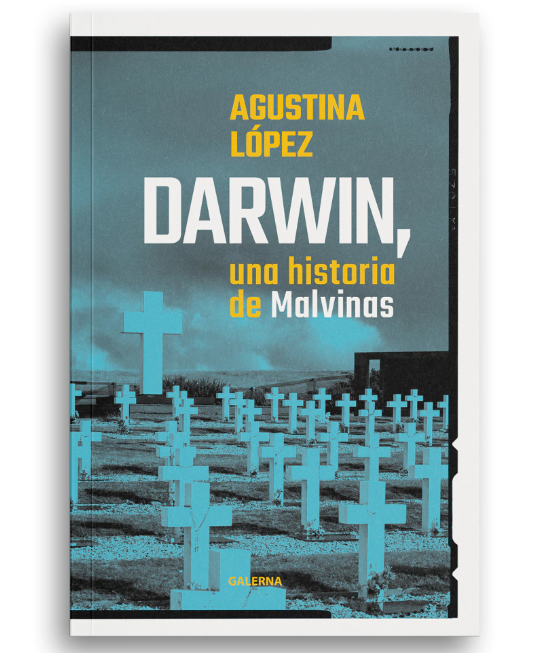
Poco tiempo después, López se convirtió en la narradora del podcast lanzado en Spotify de la Revista Anfibia titulado “La Argentina y el Mar” auspiciado por la fundación Rewilding donde se habla de la pesca china no reglamentada pasadas la milla 200, por supuesto, no mencionando ni una sola vez a Malvinas y la pesca ilegal británica. De los seis episodios, en el 80% aparece como especialista invitada Valeria Falabella referente de WCS, es decir, la ONG que auspicia el proyecto de Manes de Áreas Marinas Protegidas.
Personalidades de otras disciplinas tampoco estuvieron ajenas a estos viajes. El caso más emblemático es el de la licenciada en letras Beatriz Sarlo. Ya en 2012 había firmado junto a otros intelectuales mencionados anteriormente, como Hilda Sábato y Luis Alberto Romero, la solicitada “Malvinas: una visión alternativa” en la que abiertamente se le pedía al gobierno argentino “abandonar la agitación de la causa-Malvinas” y pregonar el “valor fundacional” de la “autodeterminación”.
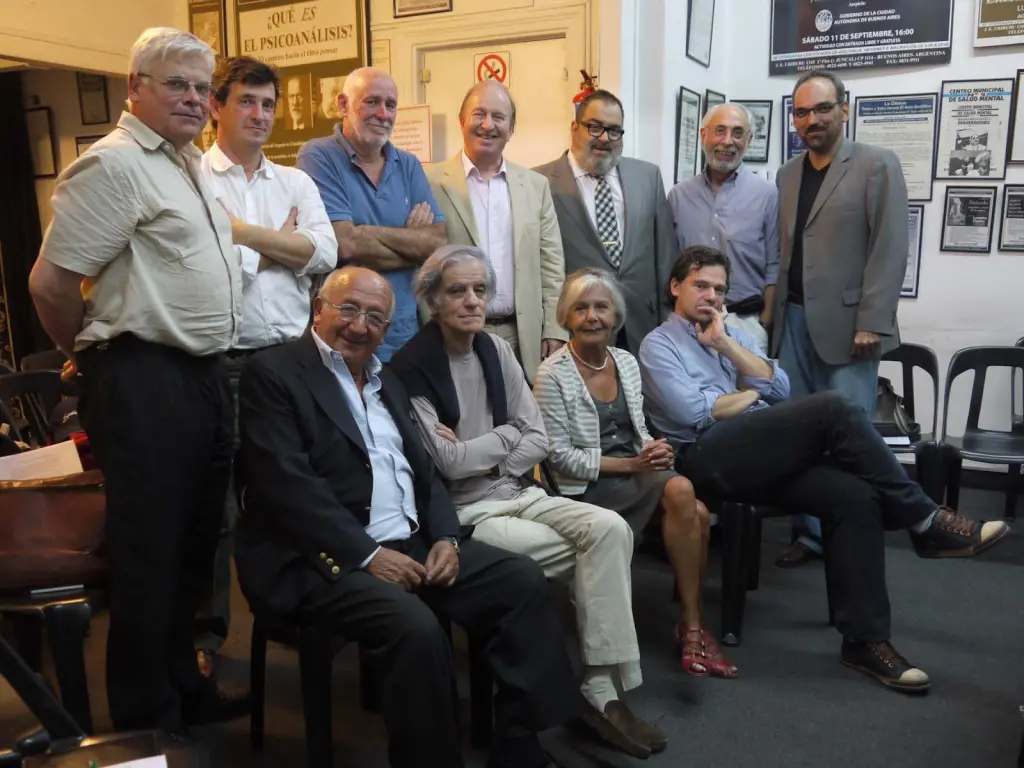
Fuente: Facebook
Sarlo viajó en el año 2013 para hacer una cobertura del falso “referéndum” de autodeterminación para luego plasmarlo en su libro de viajes “de la Amazonia a Malvinas” (ediciones Seix Barral) para finalmente rematar en 2021: “las Malvinas son territorio británico”. En la justificación de su anglopremisa, Sarlo repitió sin reflexión alguna lo que dicen los historiadores citados en los apartados anteriores: “reivindicando tierras que, aparentemente, fueron de la Argentina en la década del 30 del siglo XIX… Es decir, cuando la Argentina aún no se llamaba Argentina. Cuando aún no estaba unificada como país. Cuando aún no tenía Constitución”.
Pero la editorial Seix Barral contiene otra autora en su catálogo que viajó a Malvinas y es el caso de la licenciada en filosofía Tamara Tenenbaum:
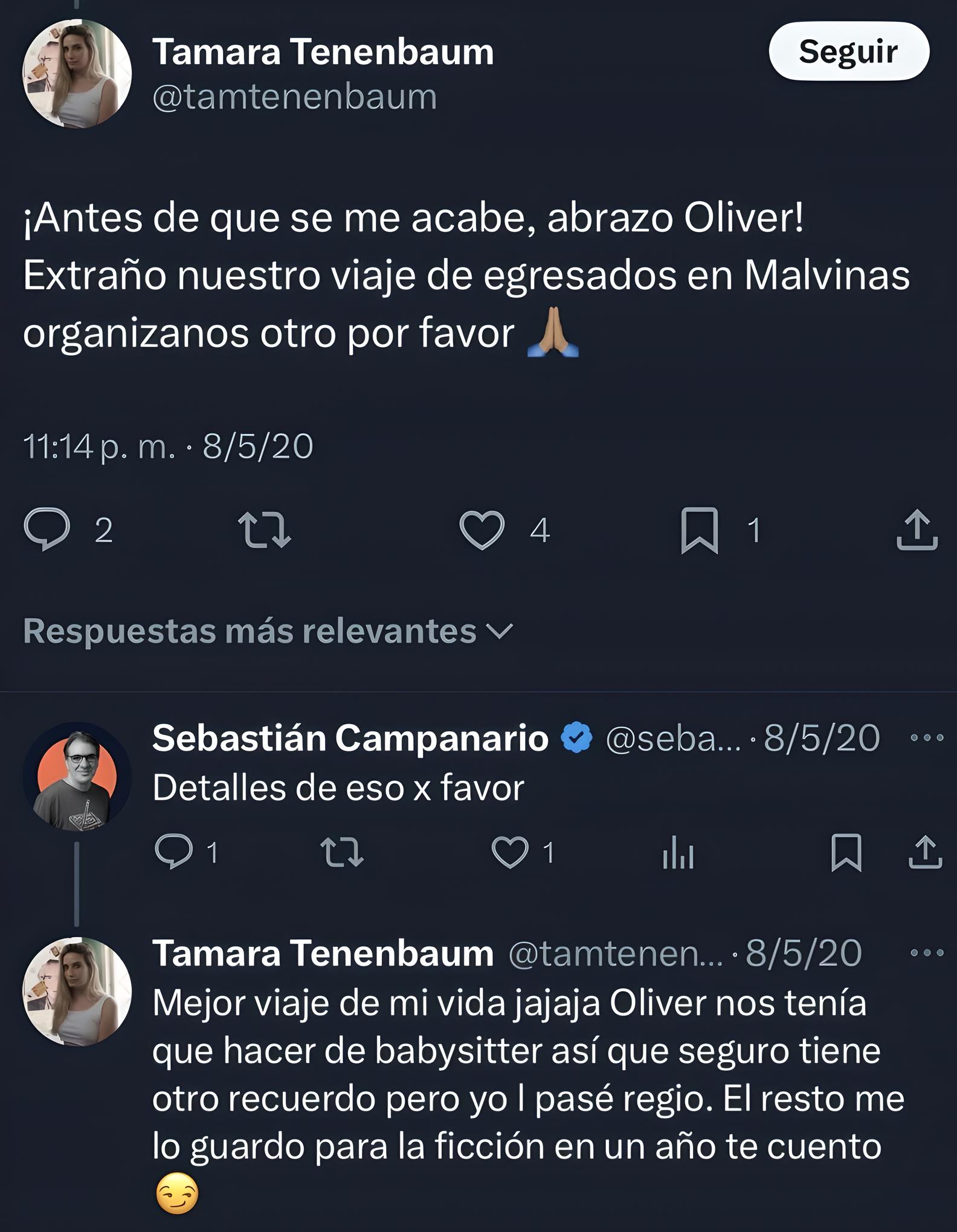
Fuente: X/Twitter
Conforme sus publicaciones en redes, viajó a las Islas Malvinas en diciembre de 2019 y se limitó únicamente a publicar dos fotografías en Instagram: una de ellas representaba los restos del helicóptero argentino en las proximidades del Monte Kent bajo el epígrafe (erróneo) de “Un helicóptero argentino derribado en 1982, sin víctimas” y, como parte del guión de los viajes auspiciados, la segunda mostraba dos pingüinos penacho amarillo con un video ingresando al mar sin mucha descripción. El caso del helicóptero derribado, nunca está de más aclarar, supuso el bautismo de fuego del grupo Alacrán de Gendarmería en un intento de infiltrarse en los montes ya ocupados por los británicos el 30 de mayo de 1982. El derribo en sí mismo, si bien no provocó víctimas fatales inmediatas, a los pocos minutos el incendio del helicóptero y las consecuentes explosiones de su carga se llevaron las vidas de 6 gendarmes.
Volviendo a la licenciada en cuestión, en el contexto del cumpleaños de Oliver Galak, recordó su viaje a las Islas bajo la frase “extraño nuestro viaje de egresados en Malvinas, organizanos otro por favor”.
Geografía, Historia, Letras y Filosofía. Mientras que en Universidades Nacionales y otras facultades de la UBA sus comunidades académicas se desviven por incorporar a Malvinas y las problemáticas del Atlántico Sur en su oferta curricular de grado y de posgrado, en la Facultad de Filosofía y Letras de la calle Puán afirmamos que sólo quedaron indemnes del poder blando británico las carreras de Bibliotecología, Antropología, Artes, Edición y Ciencias de la Educación. Me pregunto, para el caso de Tamara Tenenbaum en particular y habiendo tenido tan sólo 30 años cuando viajó pagada por la embajada, ¿hubiera aceptado recorrer la porción de su país colonizado con el dinero del propio Estado colonizador de haber tenido una mínima aproximación de Malvinas a lo largo de su carrera en la Universidad?
El Museo Malvinas vs el Falkland Island Museum
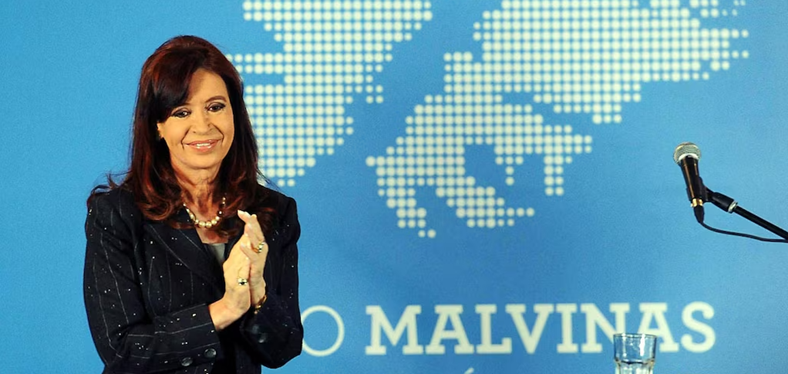
Cristina Fernández de Kirchner en la inaugurando el Museo Malvinas. Fuente: Télam
Permítanme abrir una pequeña anécdota de la que fui testigo personal pero que sirve los efectos de ilustrar mejor este artículo y entender un posible origen a los mencionados vuelos coloniales.
El 10 de junio de 2014 el Estado argentino inauguró en la Ciudad de Buenos Aires dentro del Espacio Memoria y Derechos Humanos (ex ESMA) el Museo Malvinas e Islas del Atlántico Sur. El objetivo era claro: no bastaba únicamente con que la diplomacia argentina avanzara con los apoyos diplomáticos estratégicos a nuestro reclamo de soberanía (UNASUR en 2011, Unión Africana en 2013 y G77+China por citar algunos ejemplos) si todavía el pueblo argentino seguía atrapado en la inercia desmalvinizadora que se venía padeciendo desde junio de 1982.
El Museo en sí mismo era una fábrica malvinizadora de tres plantas ubicada en una de las 20 áreas metropolitanas de mayor concentración demográfica a nivel mundial y que contiene el 35% de la población del país.
Pero lejos de limitarse a su proyecto original de ser un Memorial que tenga por objeto recordar y homenajear a nuestros héroes, el Museo tiene como eje principal la Soberanía, razón que lo llevó a tener un guión que incluyera desde los avistamientos españoles, su rol dentro del Virreinato del Río de la Plata y finalmente, una vez declarada la independencia el 9 de julio de 1816, cómo se consolidó ese pueblo argentino-malvinense que luego fue expulsado por la fuerza de parte de los británicos en 1833 y el consecuente largo pero constante recorrido de reclamo de soberanía, teniendo como hito principal la resolución 2065 de Naciones Unidas. A partir de julio de ese año se inició un período de masificación del Museo hasta comienzos de diciembre de 2015 que hizo que tuviéramos un promedio de 5.500 visitantes por día.
Por supuesto que cuando los británicos supieron de la existencia de un Museo del Estado nacional que aborde la Causa Malvinas en su conjunto e hiciera especial hincapié en la Soberanía, decidieron no quedarse cruzados de brazos y empezaron a verse en el Museo situaciones extrañas. Durante el período junio-agosto de 2014 tuvimos una gran cantidad de visitantes angloparlantes. Es decir, personas que hablaban en castellano con dificultad, pero que no escondían que su lengua materna era el inglés. Algunos se presentaban como “investigadores” sin mayor aclaración, otros como “ex periodistas” (literal). Vinieron en varias ocasiones y miraron y anotaron todo: la línea de tiempo de la planta baja, lo escrito por los paneles en las salas y el contenido de los videos. El punto más álgido fue cuando me tocó presenciar a uno de estos “ex periodistas angloparlantes” posicionarse al lado de una educadora para escuchar como ella exponía el recorrido del Museo a una escuela primaria, particularmente en la sala que refiere a la historia de “el gaucho” Antonio Rivero.
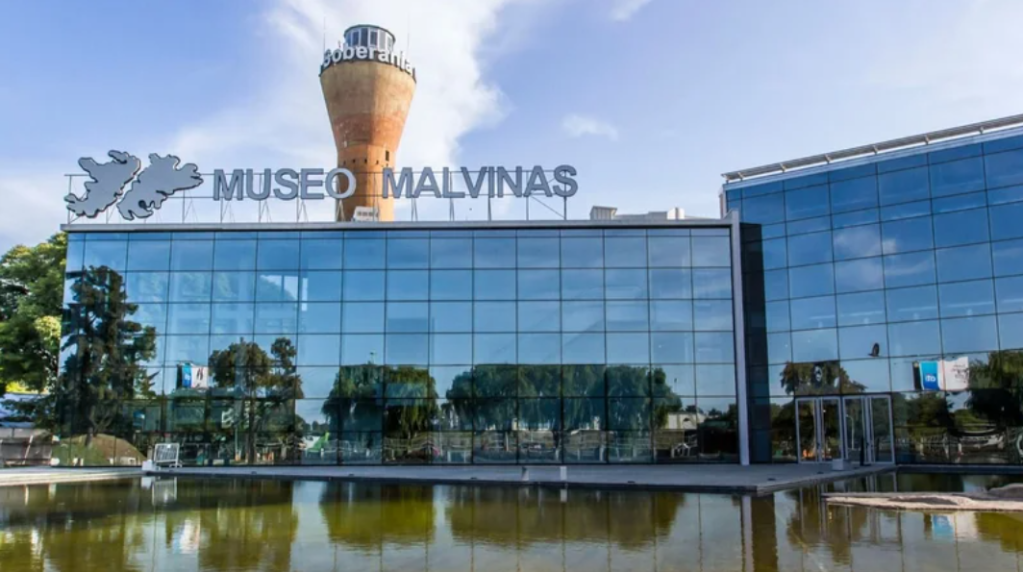
Ya para septiembre no tuvimos más anglo-invitados y luego supimos por qué. El 6 de septiembre de 2014 se inauguró en la localidad de Puerto Argentino el Falkland Island Museum que (¿casualmente?) tiene la misma estructura museológica del que se inauguró en Buenos Aires en junio de ese mismo año. Es decir, frente a la decisión del Estado argentino de contar con una herramienta educativa y cultural referida a la soberanía, el Reino Unido respondió con un mismo dispositivo colonial en Malvinas destinado principalmente para turistas extranjeros. El guión es el mismo, sólo que en vez de hablar de Hernando de Magallanes mencionan a John Davis, en vez de referirse a Luis Vernet destacan el rol de Richard Moody y en vez de recordar al gaucho Rivero le dedicaron una sala completa a la expedición del HMS Beagle, protagonizado por Charles Darwin y Robert Fitz Roy.
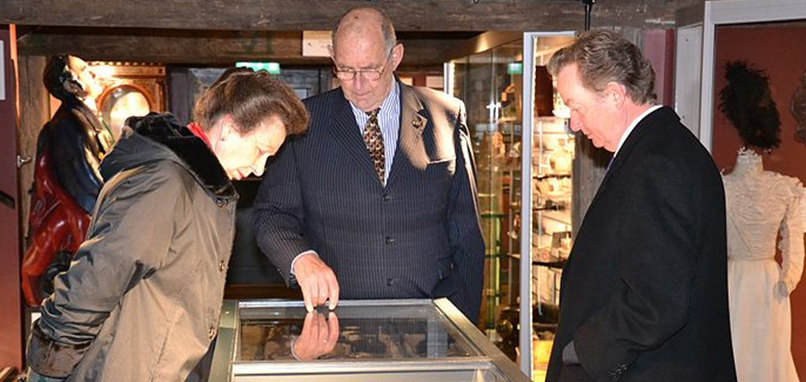
La princesa Ana del Reino Unido visita el contra-museo en las Islas Malvinas en 2016. Fuente: tracesofwar.com
Coincidentemente, después de la inauguración del Museo la embajada británica profundizó el financiamiento de viajes a periodistas y comunicadores argentinos para luego dar el salto cualitativo con el concurso regional de “Conociendo a mis vecinos de las Islas Falkland” en 2019, complementado por un stand británico a favor de la autodeterminación desde 2017 en la Expo-Prado de la ciudad de Montevideo en Uruguay y a partir de 2022, de la feria World Travel Market Latinamerica en San Pablo, Brasil.
El impacto por supuesto llegó también a los museos británicos. Pasaron de ignorar o no hablar casi nada de la guerra de Malvinas a reformular y ampliar dos muestras en Londres y en Manchester en el marco del 40° aniversario del Conflicto. Frente a las pequeñas muestras anteriores que contenían una mera narrativa “descriptiva” o “neutral”, se pasó en 2022 a una actualización mucho más subjetiva y colonial partiendo de la ya agotada premisa que “Argentina invadió las Islas”.
Cerramos este pequeño apartado con otra anécdota. Cuando asumió Macri en 2015 su ministro de cultura Pablo Avelluto propuso “desideologizar” a los Museos Nacionales apostando a “historiadores profesionales”. De febrero de 2016 a septiembre de 2018 el gobierno de Macri nombró a Federico Lorenz (el que dijo que le debemos la democracia al triunfo británico de 1982…) para asumir la gestión del Museo Malvinas.
En esos 2 años y medio, Lorenz sólo se limitó a modificar la gran línea de tiempo de la planta baja del Museo. Los cambios “profesionales” parecían dictados desde Londres: se borraron por completo las invasiones inglesas de 1806 y 1807, la invasión anglofrancesa de 1845 y la resolución 2065 de Naciones Unidas. Curiosamente se propuso que los científicos, a imagen y semejanza de Lorenz, tuvieran una mayor relevancia en la historia de Malvinas. ¿Resultado? los nuevos protagonistas a considerar iban a ser (¡adivinen!) Los miembros activos de la travesía del HMS Beagle: el jóven naturalista Charles Darwin y el almirante Fitz Roy.
La respuesta del poder blando británico
Retomando los vuelos, muchos de ustedes se deben estar preguntando ¿quién es Oliver Galak alias “el coordinador del viaje de egresados” de Tamara, y por ende, de todos los viajes a Malvinas? Bueno, este periodista nacido en la Argentina es, ni más ni menos, que el director de comunicaciones de la Embajada británica en Buenos Aires. En twitter ha compartido notas e intercambios con Nicolás Cassese, actual editor de La Nación y en cuya biografía publicada en el portal figura que cursó un máster en Política Latinoamericana en la Universidad de Londres con beca chevening del british council.
La introducción de Cassese no es menor, si tomamos en cuenta que fue él quien editó al periodista Hugo Alconada Mon cuando viajó a Malvinas en abril de 2022 en el marco de los 40 años de la Guerra. En una entrevista, el periodista mencionó que originalmente iba a ir Elisabetta Piqué, quién al final no pudo ir por cubrir la guerra en Ucrania, y en segundo lugar Cassese que “era la persona ideal porque había ido varias veces y tiene contactos allá desarrollados” pero que por cuestiones de vacunas y las restricciones del COVID-19 terminó siendo elegido ¿por descarte? el propio Alconada Mon.
 Fuente: X/Twitter
Fuente: X/Twitter
Para quienes no saben lo que es la beca chevening, se trata de uno de los principales instrumentos de poder blando y “…la otorga el gobierno británico a jóvenes profesionales argentinos que tengan un perfil de futuros líderes, formadores de opinión o tomadores de decisión, que quieran realizar su maestría en cualquier universidad del Reino Unido y se comprometan a volver a Argentina para contribuir con su desarrollo”.
No casualmente, el programa de becas se anunció en 1989 y comenzó su ejecución en 1990 al calor de los famosos Acuerdos de Madrid que supusieron la reanudación de relaciones bilaterales entre Argentina y el Reino Unido con posterioridad al Conflicto del Atlántico Sur.
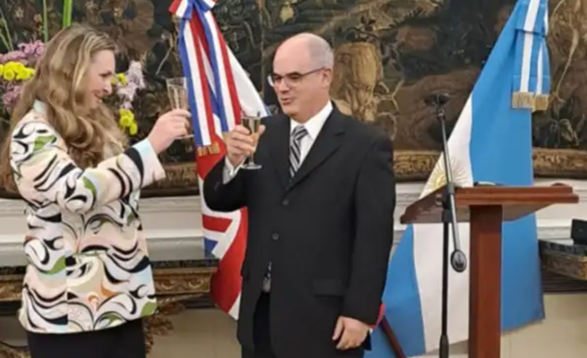
Oliver Galak en su ceremonia de condecoración con la embajadora en mayo de 2024. Fuente: diario Perfil
Volviendo a Galak, fue tan prolífica su actuación para la política exterior británica que fue condecorado en mayo de 2024 con la Orden del Imperio Británico por el mismísimo rey Carlos III y que en palabras de la embajadora británica fue “por el cuidadoso manejo que tuvo para tratar la cuestión del cuarenta aniversario del Conflicto del Atlántico Sur”. No fue condecorado por la “libertad”, la “democracia”, “el diálogo” o los “Derechos Humanos” sino por servir al colonialismo británico en Malvinas. Por eso, a la hora de dirigirse a Galak uno lo tendría que hacer con el título de Member of the British Empire (MBE).
A la hora de dar su discurso de agradecimiento en formato de monólogo de comedia, Galak ironizó sobre el vínculo angloargentino “…pero hay en particular un tema en el que hay profundas diferencias entre los dos países (…) Sé que hay varios que están pensando en esa palabra, en ese nombre que empieza con ‘M’…Sí, es ‘Maradona, es ‘M’ de ‘mano’, ‘M’ de Mundial o de México”.
Soberanía nacional cognitiva: Argentina, una Nación bicentenaria y bicontinental
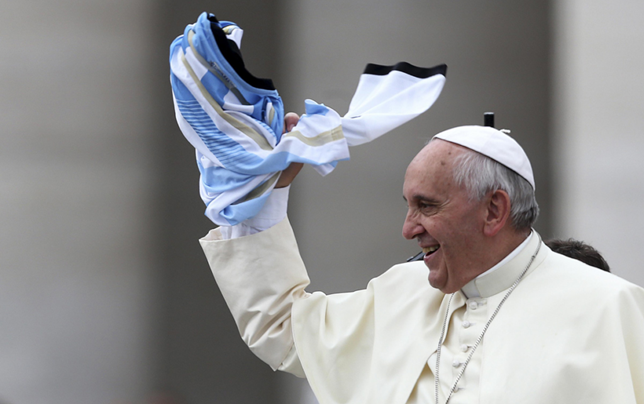
El Papa Francisco sosteniendo una camiseta de la Selección Argentina
Está claro que el poder blando es importante para los británicos. Sino su cancillería no se jactaría de ello en sus redes sociales y el mismísimo rey de Inglaterra no hubiese condecorado por sus servicios a un coordinador de “viajes de egresados” a Malvinas para reproducir su visión colonial.
La pregunta es desde Argentina: ¿qué le podemos anteponer a esta estructura de poder blando británico de la que emanan acciones sistemáticas?
Empecemos por nuestros grandes hitos recientes como Nación en este cuarto del siglo XXI: el primer Papa nacido en continente americano de la historia de la humanidad (Francisco I), campeones del evento deportivo más importante del mundo (Mundial 2022), bicampeones de América (2021/2024) y contando una vez más con el mejor jugador de la historia (Lionel Messi).
Pero estos logros que sentimos como propios ¿fueron deliberados? ¿fueron planificados en alguna oficina secreta sin luz solar en Buenos Aires o en alguna embajada argentina en el exterior? ¿Intervino secretamente la diplomacia argentina en el resultado del cónclave de marzo de 2013 que eligió a Mario Jorge Bergoglio como Papa?
Claramente la respuesta es no. Pero tenemos que ser sinceros, no es que no hubo intentos de sistematizar, aunque sea de forma embrionaria, el poder blando argentino. Entre 2003 y 2015 la Cancillería creó “comisiones para el diálogo por Malvinas” para fortalecer nuestro reclamo a través del contacto con universidades de otros países y residentes argentinos en el exterior. También se propusieron becas a isleños en Malvinas para estudiar en el continente, como alguna vez sucedió con anterioridad a la guerra de 1982, y el proyecto Pampa Azul para terminar con la cooperación científica argentina al colonialismo británico en Malvinas y empezar a estudiar el Mar argentino desde una metodología soberana. Podríamos reflexionar muy sueltos de cuerpo de los alcances y resultados de dichas medidas. Lo que sí sabemos es que tanto la gestión de Macri como la de Milei cerraron estos proyectos reorientando al timón de la Nación lejos de Malvinas sin ningún tipo de evaluación o diseño de políticas públicas que tiendan a afianzar nuestro reclamo de soberanía.
Lejos seguiremos de Malvinas si no logramos consolidar una estructura de acciones sistematizadas, equivalente o superior, a la que hoy sostiene la persistente y ya anacrónica e insólita ocupación británica de nuestro territorio. Lejos seguiremos de nuestro anhelo de soberanía, si las fuerzas vivas de nuestra Nación están dispersas y a merced de intereses opuestos a los nuestros.
Al poder inglés hay que necesariamente oponerle un poder argentino que tenga a la vanguardia la Política Exterior, la Defensa y el desarrollo Científico-Tecnológico y en la retaguardia a la Educación y la Cultura y como vaso comunicante entre los frentes el desarrollo Económico que garantizaría la ejecución y la materialidad de esta estructura.
Para llegar al objetivo de realización geopolítica de nuestro país, en tanto recuperación del ejercicio pleno de soberanía en Malvinas y el Atlántico Sur, necesariamente tenemos que partir de la premisa de que Argentina es una Nación bicontinental en lo espacial y bicentenaria en lo temporal, en tanto paradigma indispensable que nos lleve a una metodología correcta de análisis teórico, y por lo tanto, a una praxis en la acción soberana de nuestra realidad efectiva.
Juan Augusto Rattenbach es abogado (UBA), Mg. en Economía Aplicada (UTDT), docente universitario, asesor de contenidos del Museo Nacional de Malvinas y compilador de los libros Una Nación en el Mar y Ciudad de la Soberanía.
Fuente:






